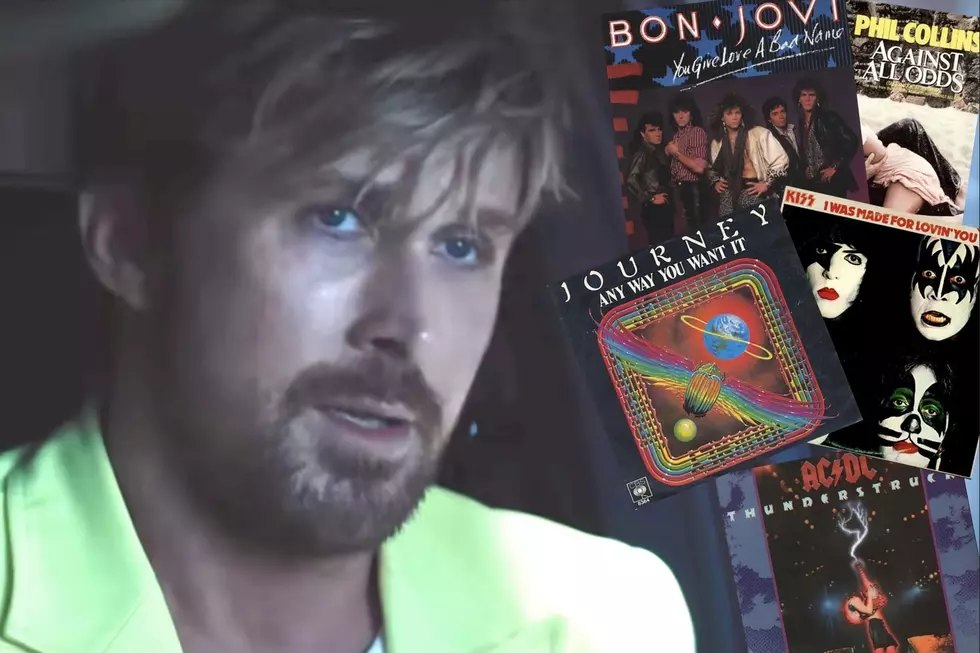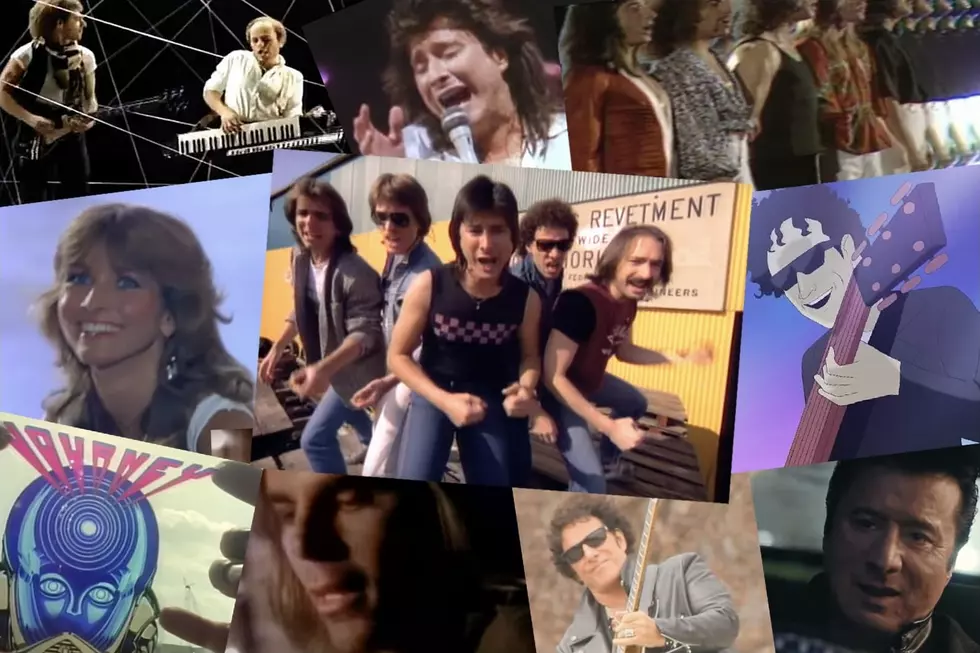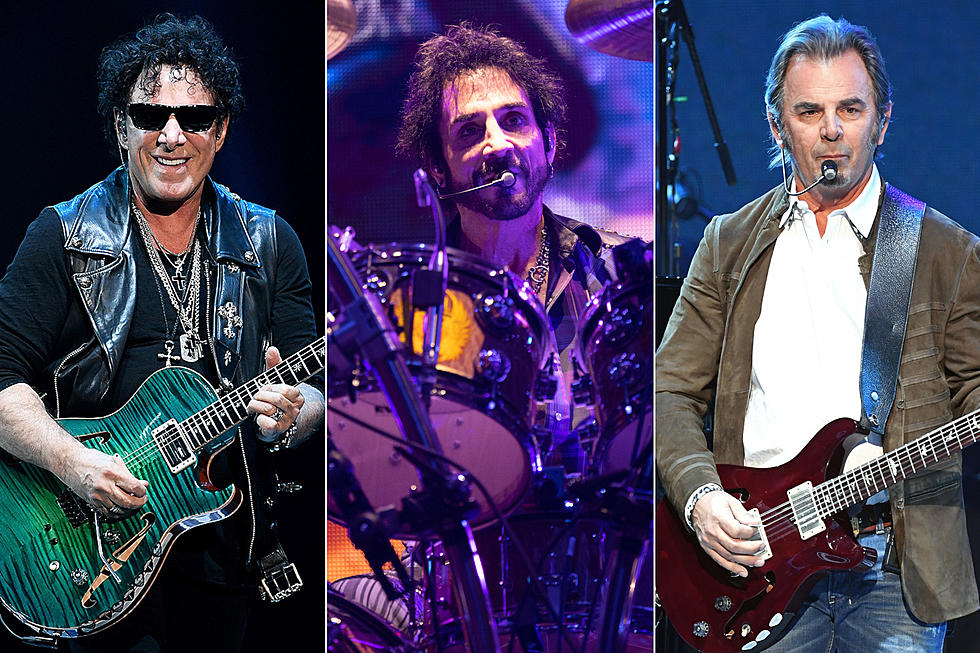
Inside the New Journey Documentary ‘Don’t Stop Believin': Everyman’s Journey’ With Director Ramona Diaz
The story of Journey finding their latest lead singer Arnel Pineda on YouTube is a tale that’s both well-known at this point, and hugely inspirational to others hoping that perhaps a similar type of rock star fame might someday come their way.
‘Don’t Stop Believin’: Everyman’s Journey’ is a new documentary that offers a bird’s-eye view of the Filipino-born Pineda and his eventual rise to success as the front man of one of America’s most successful rock and roll bands. The cameras were rolling as Pineda started his new life with Journey in 2008, tracking each moment as he began to win over concert audiences worldwide.
His enthusiastic passion for the legendary songs that he was singing each night, and the love that he had for a group that had inspired him so much as a vocalist -- which he was now part of -- were unmistakable.
The new film begins screening this weekend in theaters and on demand. We spoke with director Ramona S. Diaz about the experience of putting the documentary together.
Let’s start at the top. How did this project come about?
You know, I had heard of Arnel getting the gig through this email that was actually written by an immigration officer at the American Embassy in the Philippines who gave Arnel his visa to come to the U.S. That’s when it started. One thing led to another, and my manager called their manager, and there was a big back and forth of whether they had the story this year [in 2008] or was it [going to be] next year? And I said, “No, you have a story this year, because I think next year, the second year with the band, it’s a story, certainly, but it won’t be the story. I think it would be more dynamic and compelling [now].”
So they allowed me to film one day with the band, to show them and prove to them that they had the story. That’s when I met Arnel and then decided, “Wow, he’s really golden.” There’s something about Arnel that’s really compelling. So that’s when I decided that, "I’ve gotta make this film," and that I was that obsessed that, “Okay, this has got to happen.”
I filmed the band for a day as they rehearsed in Northern California, before their ‘Revelation’ tour in ‘08 and cut a 10-minute piece [from that] and sent it to management and they got back to us within 24 hours and said, “Come aboard, we’re hitting the road -- come with us!” I was like, “Great,” [because] we had no money, but I have a producer who made it happen.
You had a fairly large team of people working on this film. You mentioned the money issues -- how did it eventually come together so that you were able to do this?
It never came together. Seriously. This is an independently produced film. It would have been different if the band came to us and said, “Hey, make this fantastic film.” We were sort of going after that [which didn’t happen] and then they finally said yes, so we couldn’t say, “Oh yeah, can you pay for it?” So basically, my producer Capella [Fahoome Brogden] put it on her credit cards and then when she ran out of that, I borrowed money from my family and then we got some investors from friends and family, [who provided] small, small amounts of money.
That’s really how we’ve cobbled this whole thing [together]. And also at some point when the band then realized, “Oh okay, this might be something,” [they wanted to help out]. Because I don’t think they ever really [knew what it was going to be like], although they gave us access. They’re veteran rockers and I thought they were used to cameras backstage and on buses, but they weren’t used to it. They didn’t really understand what it meant to have us there constantly. So for a while, they didn’t really get it and now it makes sense to me. Someone explained to me that they were right at the cusp of [the arrival of] MTV, [before] MTV brought out the ubiquitous cameras backstage and stuff. So now it makes sense that they weren’t used to it.
They didn’t really get what the film would look like or how it would all come together. When they started getting an inkling [that], “Oh, this might be something,” two years into the project, by then we didn’t want to cross that line either of taking their money. Because then we were making [what becomes] a vanity project [by doing that], right? We needed to stay independent. So that’s what we’ve done this entire time.
What were the parameters that were laid down as far as what you could and couldn’t shoot and anything else like that boundary-wise?
You know, nothing really. They didn’t tell us that, “You couldn’t be here,” or “You couldn’t be there.” But the tough thing was when I requested that I film their process. I wanted to film them writing a song. They eventually gave me permission, but we were then, I think, a couple of years into the project. I just kept pushing. I said, “I’ve got to see that -- I’ve got to see how you guys do that.”
They gave me permission finally when we were in Manila, right after the concert and they wrote ‘City of Hope,’ which they dedicated to Arnel and the city of Manila, because they were so inspired. I said, “You’ve gotta let me film this.” By then, they knew me and they knew that I wasn’t out to get them. I think it’s just a matter of hanging out long enough that they trust you and they get used to you and [know that] you’re not [out to] get the “gotcha” moments. That wasn’t what I was after and they really fully understood that by the time that we were done.
You were following the band for two years and on paper, that looks like an extensive amount of filming. Can you talk about that part of the process?
We started in 2008, which was the summer tour and that was from June through September and even that summer, we jumped on and off. We covered the country, but we jumped on and off, because you know, we’d run out of money. So we’d jump off, make some commercials, raise some money and jump back on. So that was that whole summer, and then we followed Arnel to Manila right after the tour, because I wanted to see how he would adjust to his new life.
In 2009, we went back to Manila with the band and then after that, I actually continued filming with the guys in their homes. Which is not in the film -- I thought the film could handle that, but it couldn’t. I visited all of them in their respective homes. I wanted to see them outside of the tour. And then after that, I said, “You know, we’ve gotta keep on filming, because they’re going back into the studio.” They’re going to go back to record and I want to see that. So we did -- we waited and in 2010 that happened. So we filmed them at Fantasy [Studios] in Berkeley recording ‘Eclipse,’ their latest album.
Did the scope and direction of the project change at all during the course of making the film, from where you started out with outlining the project at the beginning?
Not really; you know, as a documentary filmmaker, you never know where it’s going to go. Arnel could have failed. It would still have been a film, but it would have been a very different film. I think the fact that he succeeded and [that] they gained new audiences and they gained this second life, it’s great storytelling for this Cinderella story. I thought it would be a Cinderella story, but I didn’t know if in actuality it would be that. I’d hoped for that, but you’re watching life unfold, so it’s very zen -- you just wait to see where it leads you.
It is a great story, because Journey is a band that certainly, they were already hugely popular, but it really has brought them a whole different audience in addition to their previous fan base. That’s really something after all of the years that this band has been together.
Yeah, it’s incredible, and you saw that actually happen in 2008. You saw this different audience coming on and I’m like, “Wow, this is incredible.” I think it took everyone by surprise. I think all of them took a leap of faith with Arnel, and Arnel took a leap of faith too, right? So there was this feeling of “Let’s see how it goes,” and it paid off for everyone.
The film is presented in a mixture of English and Filipino dialogue. How did that part develop?
I think that Arnel is more comfortable speaking in that manner and in the Philippines, a lot of people switch from Filipino to English. It’s just a matter of speaking. I realized that if I was going to get him to really articulate [about] say, the first time he performed in front of a crowd of 30,000 in Chile, I needed to liberate him from just speaking English and I understand the language, so that wasn’t a problem for me.
Were you a Journey fan?
Obviously, I grew up with their music, but I wasn’t a hardcore Journey fan. I mean, I’ve seen hardcore Journey fans [laughs]. I lived with them all throughout that summer. I thought they were a wonderful band and certainly loved their music, but I think that after this whole process, I have a newfound respect for what they’ve done. I’ve really understood what it is that they’ve done.
They created a catalog and not just one or two songs, but a catalog of music that’s timeless and works. Every night, it works. I saw it -- every night, ‘Separate Ways’ would come on and the entire [crowd of] 20,000 would [react] like it was the first time they were hearing it. And you know that they’ve heard it tens of hundreds of times. But you feel the energy, like it’s the first time. It’s amazing -- how did he do that? That’s magic. Not everyone can do that. So to me, it’s just pretty incredible what they’ve done.
As a filmmaker, had you seen the ‘Frontiers and Beyond’ documentary that they’d done in the ‘80s?
Yes -- I’d seen it in the process of research.
That really illustrates how that band did everything bigger than everybody else in that decade. It was shot by NFL Films and legendary NFL broadcaster John Facenda voiced it. How did that play into your psyche when you were working on this project? Did you think about that at all?
Oh, absolutely. You know, when you’re editing a film, you start out with a five-hour cut, right? So I did really want to cover the history. It was surprising to me to find out that they were the ones who started the [usage of] big monitors on stage, so that people in the nosebleeds would feel like it was still an intimate experience.
God, that’s really smart. Now of course, it’s a matter of course, right? Everyone does it. But the fact that they were the first ones, that they actually owned the company that did that, that rented it out . . . I was like, “Wow.” I wanted to at some point talk about that. It’s going to be in the DVD extras, obviously, but it just couldn’t be part of this film.The film couldn’t support it or really examine it in any kind of profound way.
But they did [pioneer that] and I had no idea. That was all new to me in that process of researching the band. It’s pretty incredible. And of course, then they got their reputation for being corporate rock, because they were so slick and got sponsors. Now everyone gets sponsors. Ross Valory actually told me a really funny story about how Mick Jagger came around and visited them in San Francisco, wanting to know how they did it and what they were doing business-wise.
There’s a moment in the film where you capture Chicago singer Jason Scheff [a replacement himself for original Chicago lead singer Peter Cetera] talking to Arnel backstage. That moment feels very spontaneous -- I don’t know how engineered that moment was or wasn’t . . .
No, it wasn’t at all!
You don’t necessarily know that is a singer from the band Chicago walking up to Arnel . . .
No, I didn’t. But someone, who I think was with Arnel, mentioned that Jason was backstage. I didn’t hear that -- we were just following Arnel. My cinematographer was on him and I said, “He’s our guy -- he’s our story -- follow him wherever,” and it just happened. That’s when the documentary is really golden, when those things happen and you don’t plan it.
You’ve acknowledged in the past your hesitation to do a project like this, because of what a bear of a task it is to clear popular music for a film. Can you talk about that part of working on this documentary?
Oh, my God. You know, I don’t know the details of it. Because you have music supervisors and it’s really all lawyers talking to lawyers. I knew it from other films, one piece of music appearing by Liza Minnelli and Donna Summer -- I knew even that piece of music was so difficult to clear. We cleared like 13 Journey songs, which is one of the most difficult catalogs to clear. But of course, they signed on to make the film, so I hate to say it was easy, but it was easier.
But it’s still very complicated, because at some point even if they want to, it’s beyond their control. It’s a whole lot of details that even I right now don’t completely understand. But I knew it would be difficult, just from making other films. Of course at the end of the day if we couldn’t clear it, it would have really been not good.
Watch the Trailer for 'Don't Stop Believin': Everyman's Journey'
More From Ultimate Classic Rock









